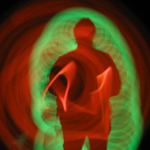More on telepathy, psychic abilities and skeptics of paranormal activity
I was reading about the study on telepathy over at the usually extremely skeptical slashdot and there were actually some good links and ideas from people open to the idea of "paranormal" abilities, which are really just abilities that modern science has not yet been able to fully explain.
One poster pointed to this article as evidence that serious scientists are studying psychic abilities and having some success in proving that certain people have these abilities:
As I said, paranormal is just something observed that hasn't been proved or thoroughly debunked yet. Randi thinks of himself as a debunker, but he's not objective. Later on in the article Schwartz deals with Randi:
Besides, James Randi asks you to take a great many things on "faith." He assumes that psychics and mediums are frauds and hucksters before he even hears their claims. This is not science. This is not even rational. It's faith. Randi has "faith" that there are no paranormal abilities. It's an article of faith for him that every claimant is a fraud.
Personally, I prefer to keep an open mind.
Apparently, so does the CIA. The Central Intelligence Agency has been experimenting with "remote viewing" for decades. Here's the abstract:
My main problem with "skeptics" is their irrational behavior and scientifically unsupported claims -- all of which are ostensibly meant to prove the superiority of sound science. Talk about ruining your own case. Take a look at this example of "logic" by some leading skeptics:
Basically, Hyman's logic seems to be that if the psychics (and the researchers) fall short of infallibility in any way, then that means they are total frauds in every way. That's not logic. From perusing A List of Fallacious Arguments, it would seem to point to "Moving The Goalposts (Raising The Bar, Argument By Demanding Impossible Perfection)" or maybe "Argument By Selective Reading". Either way it's a crutch for someone who can't make a decent argument without resorting to fallacy. I thought Hyman was supposed to be defending rational thought. Instead he is abusing it to defend his preconceived notions. I should also note that the list above comes from a skeptic -- one who appears more reasonable than Hyman or James Randi.
Anyway, I don't expect that we'll "prove" psychic powers are real anytime soon, but I think it's worth exploring whether certain people have the gift. Actually, I had an interesting idea about how to prove the old cliche "mind over matter" isn't just a cute saying: Study a bunch of psychics like Dubois in a controlled environment. Then, for some psychics, bring in some flaming skeptics like Randi and see if Randi's uncontrollable hatred and bias actually affects the accuracy of the psychic, just by being in the same room.
Could it be that skepticism is a psychic power?! :-)
One poster pointed to this article as evidence that serious scientists are studying psychic abilities and having some success in proving that certain people have these abilities:
But what few may realize is Dubois' prime power - making contact with people after death - has been subjected to three years of UA research scientifically designed to determine if she is an authentic "medium" or a fraud.That's exactly the attitude you need to have to investigate something like the paranormal. You can't assume it exists and you can't be a raving nut like James Randi who refuses to even entertain the possibility of paranormal activity. You need to keep an open mind, unclouded by bias.
Although the studies have stirred controversy nationwide and have been slammed by several skeptics, the Harvard-trained UA professor who ran them strongly defends their legitimacy, as does Dubois.
"There is no question this is not a fraud - some people really can do this, and Allison is one of them," said psychology professor Gary E. Schwartz, who directs the UA's Human Energy Systems Laboratory where the experiments with Dubois and other well-known mediums - including John Edward of TV's "Crossing Over" fame - have been conducted.
"Many people claim to do this, and there are clearly frauds out there. Allison was repeatedly tested and passed every test.
"As a scientist, I approach all this as an agnostic - I don't believe it; I don't disbelieve it. After testing her under conditions that ruled out the possibility of fraud, I came to the conclusion she's the real deal."
As I said, paranormal is just something observed that hasn't been proved or thoroughly debunked yet. Randi thinks of himself as a debunker, but he's not objective. Later on in the article Schwartz deals with Randi:
Perhaps more entertaining is the ongoing public feud Schwartz has with the flamboyant magician and professional skeptic James Randi, who has offered $1 million to "anyone who can show, under proper observing conditions, evidence of any paranormal, supernatural, or occult power or event."Booyah! It's true: Randi is fucking clownshoes. He's a sideshow, and he has too much vested interest in keeping his money. How can he claim to be a scientist if he's offering huge cash prizes? That's not science. The reward is the discovery itself, not a million bucks.
Randi even wrote a letter to the University of Arizona Foundation in 2001, asking the university to submit Schwartz's research data to an independent panel for evaluation, to see if the UA might win the $1 million.
In one critique, Randi called Schwartz "an academic who has abandoned reason to accept everything and anything offered him by scammers from John Edward to the gypsy down the street."
Schwartz rejected Randi's million-dollar bait.
"I refused for the same reason all serious scientists in America and Europe have refused. The process of this prize lacks scientific credibility and integrity," he said. "This guy is not a scientist - he is a mediocre magician who loves the public eye."
Besides, James Randi asks you to take a great many things on "faith." He assumes that psychics and mediums are frauds and hucksters before he even hears their claims. This is not science. This is not even rational. It's faith. Randi has "faith" that there are no paranormal abilities. It's an article of faith for him that every claimant is a fraud.
Personally, I prefer to keep an open mind.
Apparently, so does the CIA. The Central Intelligence Agency has been experimenting with "remote viewing" for decades. Here's the abstract:
In July 1995 the CIA declassified, and approved for release, documents revealing its sponsorship in the 1970s of a program at Stanford Research Institute in Menlo Park, CA, to determine whether such phenomena as remote viewing "might have any utility for intelligence collection" [1]. Thus began disclosure to the public of a two-decade-plus involvement of the intelligence community in the investigation of so-called parapsychological or psi phenomena. Presented here by the program's Founder and first Director (1972 - 1985) is the early history of the program, including discussion of some of the first, now declassified, results that drove early interest.It's probably been reclassified by now, but at least some data got out and onto the net.
My main problem with "skeptics" is their irrational behavior and scientifically unsupported claims -- all of which are ostensibly meant to prove the superiority of sound science. Talk about ruining your own case. Take a look at this example of "logic" by some leading skeptics:
Hyman's research has included examination of alleged psychic readings and critiques of parapsychological experiments. He acknowledges that Schwartz has excellent academic credentials but blasts his medium research.Excellent response by Schwartz. Hyman is blantantly ignoring everything that doesn't fit into his worldview, then Hyman turns around and blasts Schwartz for the failures in his model.
"Probably no other extended program in psychical research deviates so much from the accepted norms of scientific methodology as this one."
After reviewing Schwartz's book, "The Afterlife Experiments," he said readings by Schwartz's "star mediums," like Dubois, "strike me as no different in kind from those of any run-of-the-mill psychic readers and as completely consistent with cold (fake) readings."
He criticized Schwartz for other research errors, such as using only subjects "predisposed" to believe in this phenomenon and for "inappropriate statistical tests."
In response, Schwartz said Hyman ignored and omitted facts that do not support his biases. "This is like a skeptical sports reviewer focusing on Michael Jordan's few air balls and fouls, and drawing the conclusion that Jordan can't play basketball," he said.
Basically, Hyman's logic seems to be that if the psychics (and the researchers) fall short of infallibility in any way, then that means they are total frauds in every way. That's not logic. From perusing A List of Fallacious Arguments, it would seem to point to "Moving The Goalposts (Raising The Bar, Argument By Demanding Impossible Perfection)" or maybe "Argument By Selective Reading". Either way it's a crutch for someone who can't make a decent argument without resorting to fallacy. I thought Hyman was supposed to be defending rational thought. Instead he is abusing it to defend his preconceived notions. I should also note that the list above comes from a skeptic -- one who appears more reasonable than Hyman or James Randi.
Anyway, I don't expect that we'll "prove" psychic powers are real anytime soon, but I think it's worth exploring whether certain people have the gift. Actually, I had an interesting idea about how to prove the old cliche "mind over matter" isn't just a cute saying: Study a bunch of psychics like Dubois in a controlled environment. Then, for some psychics, bring in some flaming skeptics like Randi and see if Randi's uncontrollable hatred and bias actually affects the accuracy of the psychic, just by being in the same room.
Could it be that skepticism is a psychic power?! :-)
Labels: CIA, fraud, paranormal




0 sick little monkeys said:
Post a Comment
Home